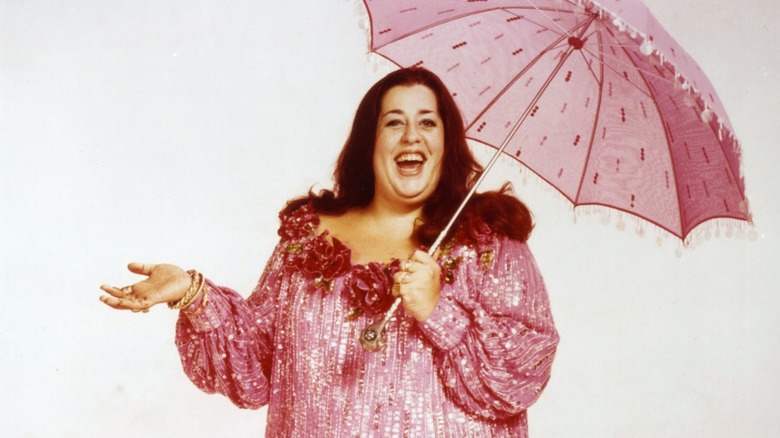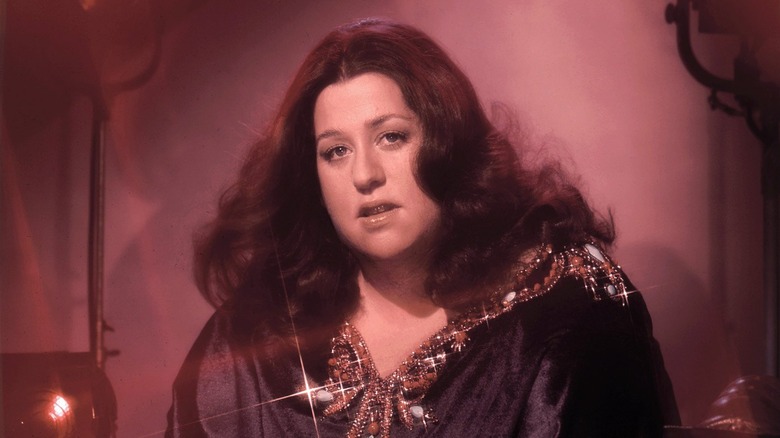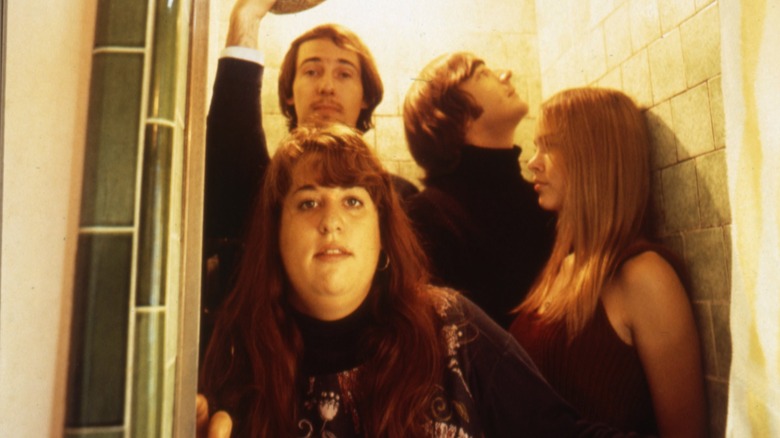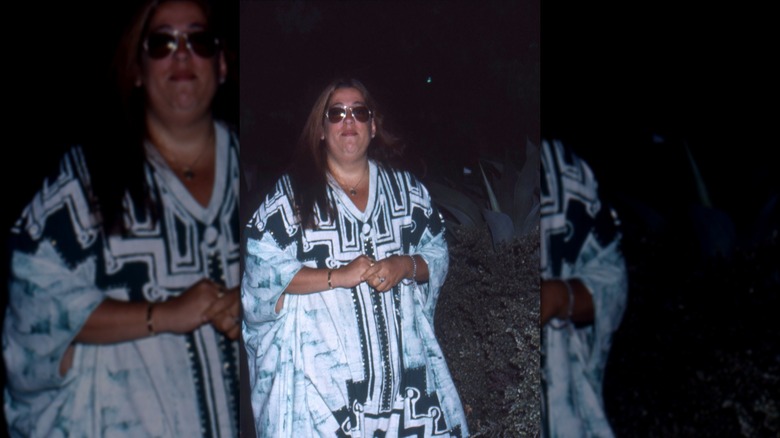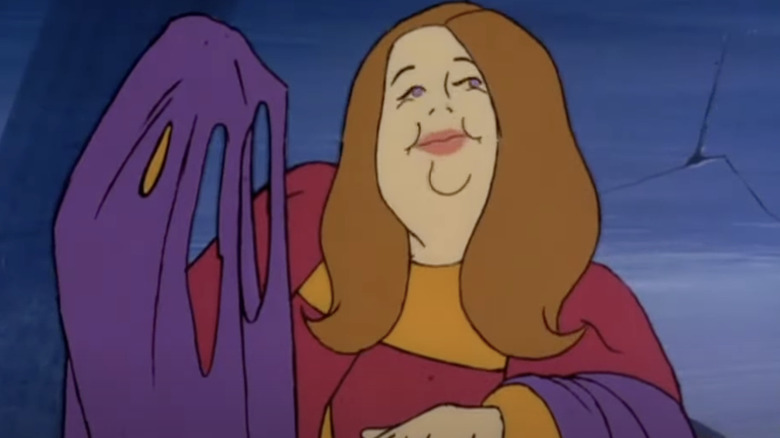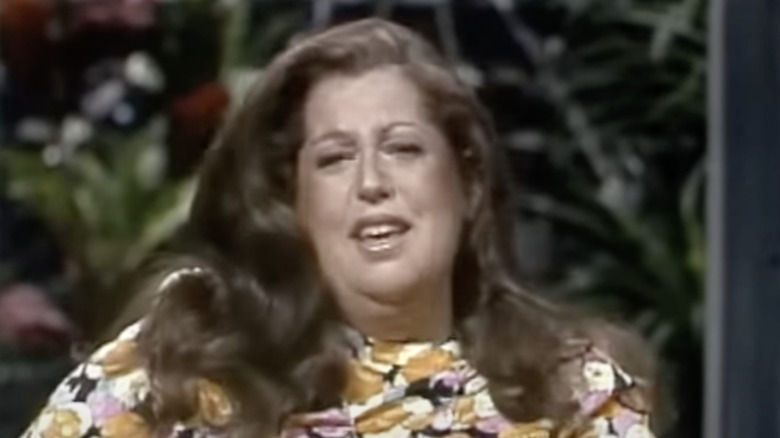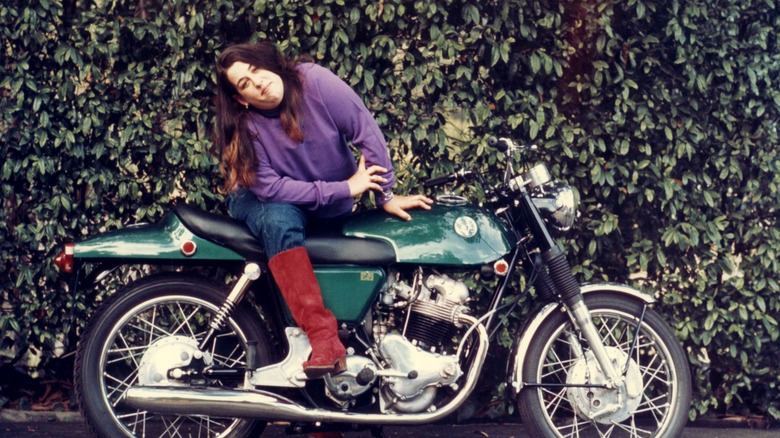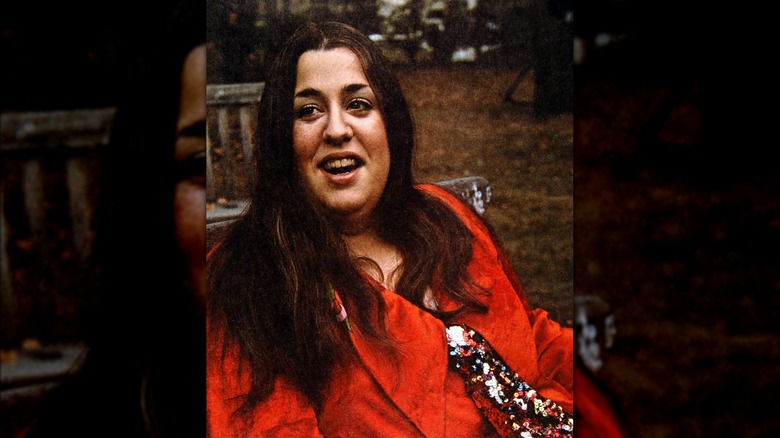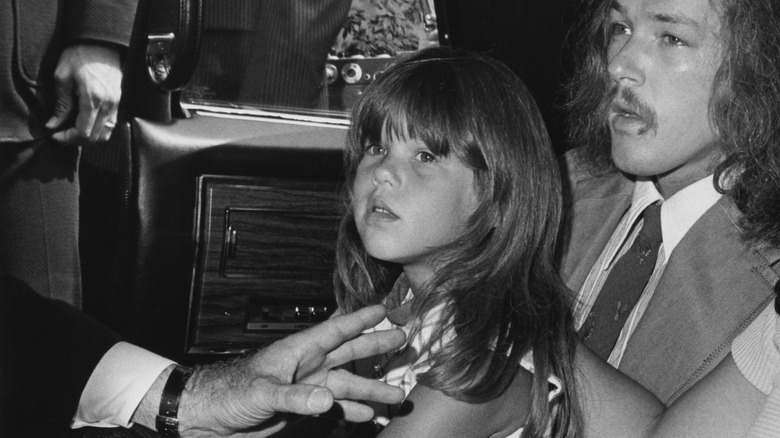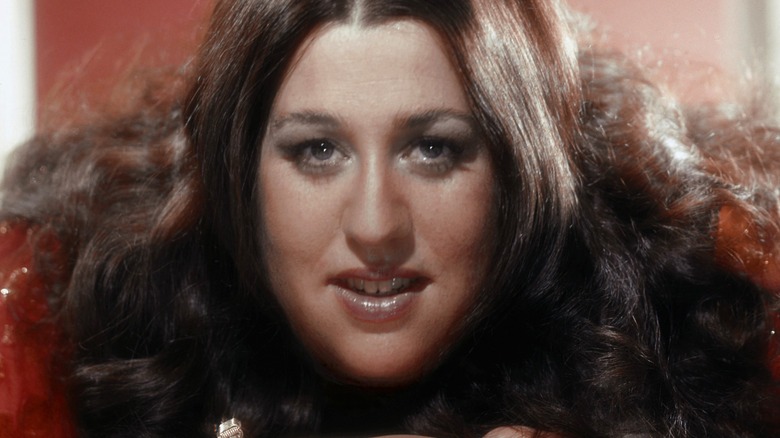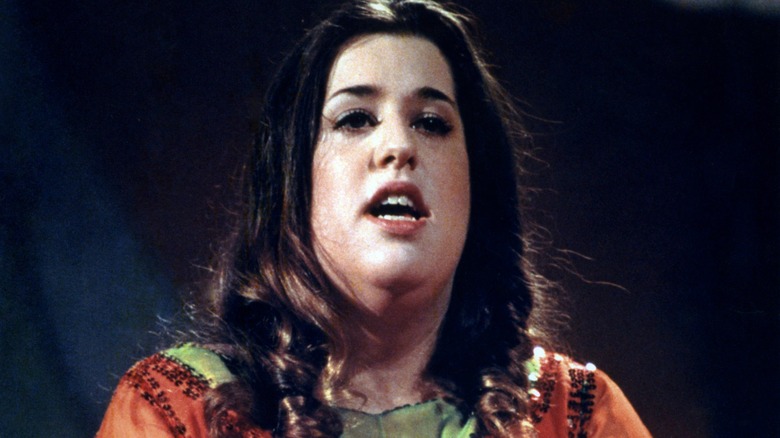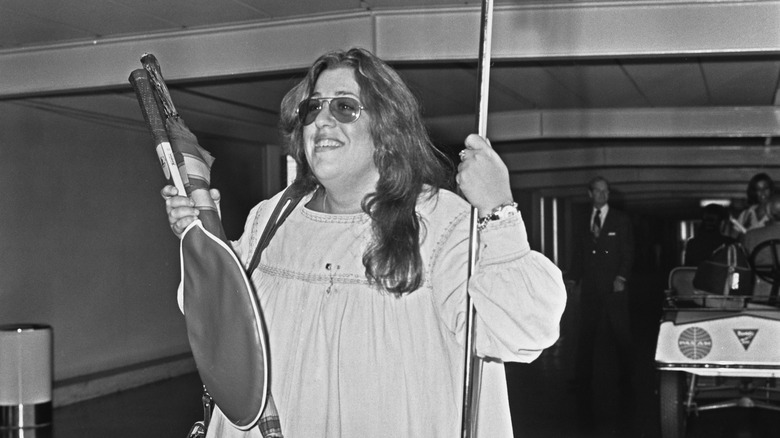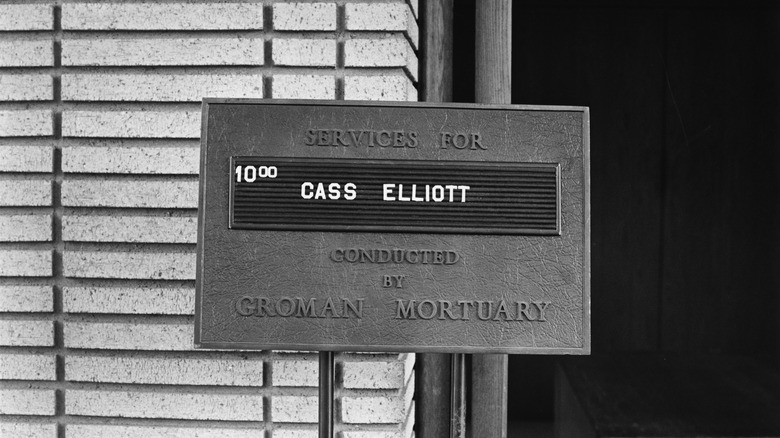What The Final 12 Months Of Cass Elliot's Life Looked Like
Until the very end of her tragically and unexpectedly short life, Cass Elliot lived a life full of exceptional performance and unrivaled musical skill that left millions entertained and moved. In the 1960s, she became a star — and the breakout personality — from one of the decade's definitive acts, the Mamas and the Papas. The four-member group combined a countercultural, hippie sensibility with folk sounds and unmatched vocal harmonies on enduring hits like "Monday, Monday," "Creeque Alley," "Dedicated to the One I Love," and "California Dreamin'." Almost always, the crystal clear and soulful timbre of "Mama" Cass Elliot soared above all the instruments and the voices of her bandmates.
Following the demise of the Mamas and the Papas in the early 1970s, it was inevitable that Elliot would find solo success, having enjoyed a hit on her own while still in the band, with "Dream a Little Dream of Me." Some of Elliot's endeavors succeeded, some didn't, and her life was ultimately a sadly interrupted one when she died in July 1974 at the age of 32. Here's a look at how the formerly "Mama" Cass Elliot spent what would be her last year among the living.
Cass Elliot switched genres and reinvented herself
In 1972, Cass Elliot recorded "The Road is No Place for a Lady." It wasn't her first solo album, but the first released after the Mamas and the Papas permanently split up following 1971's "People Like Us" LP. "The Road is No Place for a Lady" completely failed to make the Billboard 200 albums chart, prompting Elliot to seriously rethink her musical style and ambitions in 1973.
She fired her Mamas and the Papas-era manager Bobby Dunhill and brought in Allan Carr, who favored an old-fashioned, glitzy, glamorous, highly theatrical form of show business. In addition to producing Broadway musicals, he managed the careers of entertainers that appealed to an older audience — Tony Curtis, Herb Alpert, Ann-Margret — and similarly steered Elliot away from the youth-oriented rock, pop, and folk which she performed in the Mamas and the Papas. Elliot liked the idea; she enjoyed showmanship and crowd-pleasing chestnuts — her biggest solo success by far had been her no. 12 hit 1968 cover of the old standard "Dream a Little Dream of Me." Together, Carr and Elliot created a new image for the latter, a cabaret performer meets singer of vocally showy ballads.
Baltimore honored Cass Elliot
"Cass Elliot" is a stage name. The singer was born in 1941 as Ellen Naomi Cohen in Baltimore and grew up in the city's Forest Park neighborhood. Two weeks shy of her high school graduation in 1959, the future Cass Elliot left school to pursue a career in the arts, soon thereafter moving to New York City. She achieved so much in the years after leaving her hometown, however, that Baltimore mayor William Donald Schaefer launched Cass Elliot Day, a city-wide, day-long celebration of its famous former resident, who attended all the events. The festivities on August 15, 1973 began with a parade consisting of classic cars, clowns, and local marching bands. Elliot, who had just had a persistent leg injury treated at Baltimore's Sinai hospital, nursed a wrapped appendage from the back of a limousine along with her mother.
A camera crew filmed highlights of the day for later use in a TV special, such as visits to the USS Constellation battleship and the Charcoal Hearth restaurant. Cass Elliot Day culminated in a small graduation ceremony. Mayor Schaefer personally presented Elliot with her high school diploma; she wore the traditional graduation garb of a mortarboard and robe.
She didn't want to be called Mama anymore
Driving home the idea that she wasn't "Mama Cass" anymore, in September 1973, Elliot released the album "Don't Call Me Mama Anymore." A live album, recorded weeks earlier at Chicago nightclub Mr. Kelly's, it featured Elliot singing "Extraordinary" from the musical "Pippin," a medley of old torch songs, and a new version of "Dream a Little Dream of Me." The album didn't reach the Billboard album chart.
Elliot then starred in a promotional tie-in TV variety special. Also called "Don't Call Me Mama Anymore," the event aired on CBS around the time of the album's retail release and was very poorly received. "'Mama' is the worst hour of television to hit the air in many years. It has all of the disaster elements," James Brown of the Los Angeles Times wrote. "If Cass doesn't carefully avoid such future television misfires, they not only won't call her mama, they won't call her, period." Segments on the show included guest star Dick Van Dyke and Elliot playing Laurel and Hardy performing a scene from "Romeo and Juliet," and Broadway star Joel Grey stopping in to join Elliot in a duet of "Those Were the Days" — the theme song from "All in the Family" — in character as Archie and Edith Bunker. Elliot's former bandmate Michelle Phillips and animal performer Bruno the Bear would also appear on what would turn out to be Elliot's only variety TV special.
Cass Elliot was all over television
While "Don't Call Me Mama Anymore" didn't instantly transform Cass Elliot from folk-pop star into a variety show force, the performer nevertheless showed up on television screens often throughout the 1973-1974 broadcast season.
In "The Haunted Candy Factory," an episode of the celebrity cameo-heavy Saturday morning cartoon "The New Scooby-Doo Movies" that aired in fall 1973, Elliot voiced an animated version of herself. For a week in November 1973, Elliot served on the all-star panel of the popular daytime game show "Match Game." She also made the rounds on the talk show circuit, guesting on multiple episodes of "The Mike Douglas Show," "The Tonight Show Starring Johnny Carson," and "The Merv Griffin Show." Elliot also ventured into playing fictional characters, landing a prominent role in the 1973 made-for-TV movie "Saga of Sonora." In this musical set in the old West, Elliot co-starred and sang as the character "Mrs. James."
She collapsed at The Tonight Show
Nowhere did Cass Elliot pop up on television more than "The Tonight Show Starring Johnny Carson." She appeared on the venerable late-night talk show (and occasionally guest-hosted) more than 20 times, including four occasions over the course of 1973 and 1974. And on two of those appearances, she suffered notable physical harm. First, while leaving the studio, she tripped on an improperly placed sewer grate and had to go to a local hospital to see if she broke a bone.
Weeks later, she returned. But around 10 minutes before the show was scheduled to begin, Elliot passed out and was rushed to a local hospital via ambulance. "I had a very bad headache that day and I hadn't been able to eat anything," Elliot explained during what would be her final appearance on "The Tonight Show" on May 7, 1974. "My blood sugar level dropped or something and I just sort of tipped over." The incident required a four-day hospital stay, and the event made headlines around the U.S. and in Europe.
Cass Elliot sought out sobriety
As a major rock star in the 1960s, Cass Elliot imbibed a lot of drugs and intoxicants. But by 1973, she attempted to put substance abuse behind her. "I overdid it — drugs, booze, the lot. Staying out all night, just being totally undisciplined," Elliot told the Daily Express (via "Dream a Little Dream of Me"). "I'm not that self-destructive anymore, because I have a lot of things to live for now." With the assistance of a psychotherapist, Elliot had started a mental and physical health regimen and had stopped using drugs, or at least harder ones, particularly heroin or cocaine.
"She would use pot to mellow her out when she wasn't doing the other or coming off the other drugs. And certainly, she would have had a couple of drinks if she weren't having any drugs," ex-husband Donald von Wiedenman said in "Dream a Little Dream of Me." Elliot didn't drink at the parties thrown for her during her last weekend alive in 1974, and a coroner found no alcohol or drugs of any kind in her body.
If you or anyone you know needs help with addiction issues, help is available. Visit the Substance Abuse and Mental Health Services Administration website or contact SAMHSA's National Helpline at 1-800-662-HELP (4357).
She recorded some fast food jingles
In 1973 and 1974, Cass Elliot took her music into the commercial realm, quite literally. Over the course of multiple sessions, she recorded a series of jingles for the midwestern American fast food chain Hardee's. "Hurry on down to Hardee's," Elliot sang, "where the burgers are chaco-broiled." That last line provided the restaurants with its commercial slogan, heard often over the air as Elliot's ads were a crucial part of the company's massive expansion in the 1970s.
Each of the songs varied slightly and were used in radio and television advertising campaigns, and all were composed by Tupper Saussy, songwriter and keyboard player for the late '60s psychedelic pop band (and the Mamas and the Papas contemporary) the Neon Philharmonic. Elliot didn't appear in any of the TV ads, nor was she identified in any of the spots; it was a for-hire gig that kept her voice on the radio until she could release new singles.
She raised her daughter
In 1967, Cass Elliot gave birth to a daughter named Owen. The only child of the entertainer, Owen was born near the end of Elliot's ultimately annulled six-year marriage to Jim Hendricks (not that one). Elliot remarried a few years later, to Donald von Wiedenman, but that marriage would be over by 1972, leaving Elliot a single parent in charge of her daughter's upbringing in 1973 and 1974. Hendricks wasn't Owen's father; her real paternity was a secret, but in the summer of 1974, Elliot promised her friend and former the Mamas and the Papas cohort Michelle Phillips that she'd reveal to her the biological father of her daughter upon her return from a series of concerts in London. However, this never happened because Elliot would die just after those shows. Phillips later managed to track down the man, a musician named Chuck Day.
Upon the death of her mother, Owen was adopted into the family of Eliot's sister, singer Leah Cohen, and her husband, drummer Russ Kunkel.
Cass Elliot played a residency at a historic London theater
As part of her shift into away from rock star to classic-nightclub-style entertainer, Cass Elliot and manager Allan Carr put together a revue-style show — a collection of soft pop songs, show tunes, dance numbers, and comic sketches that would play well to an older, broad audience in an intimate, theatrical setting. Elliot and Carr hired a choreographer, a musical director, and two men to serve as backup singers, dancers, and skit foils. Among the numbers that Elliot rehearsed and polished were the standard "I'll Be Seeing You," a Mamas and the Papas medley (featuring "Dream a Little Dream of Me"), a cover of Paul McCartney's "My Love," and new songs written in a throwback style, like "Don't Call Me Mama Anymore."
Elliot then took the show on the road, playing nightclubs, casinos, and supper clubs in Pittsburgh, Miami, San Francisco, Dallas, Chicago, and Las Vegas. That was all a mere warmup for the fulfillment of a long-held ambition of Elliot's: In the summer of 1974, she took her new act to the Palladium, one of the most respected and historic venues in London. Elliot sold out the theater during her two-week series of concerts.
She was figuring out her next moves
The comeback, or the beginning of a new career phase, of Cass Elliot revolved around her run of shows at the Palladium in London. She was so pleased with her performance at the well-attended dates that she used it as a launchpad for bigger and better show business opportunities to come. Her manager, Allan Carr, received at least 20 offers for his client for roles in big-budget films and on mainstream, network television shows. She'd also started to plan a small tour to begin after the Palladium dates.
By mid-1974, Elliott had read scripts for TV sitcoms and films but was also continuing to hone her future approach to music. In addition to veering away from performing rock and contemporary pop in favor of standards and traditional pop, Elliot was also actively seeking out opportunities to produce music for up-and-coming artists. She'd already produced a single for Canadian singer Roberta Sherwood and assisted on multiple projects for 3's a Crowd, a Canadian folk trio for whom she'd helped negotiate a record deal.
Cass Elliot spent her last day celebrating
On Saturday, July 27, 1974, Cass Elliot performed the last two concerts of her two-week stand at the Palladium in London. Backstage, she wrote a message in lipstick on the mirror of her dressing room for the next scheduled performer, Debbie Reynolds: "Dear Debbie, if they are half as nice to you as they were to me, you will have a great time. Love Cass." And with that, Elliot was off into the city to party and celebrate well into the next day. Immediately after leaving the Palladium, Elliot attended a birthday party for Mick Jagger at a residence in the Chelsea neighborhood. Elliot was spotted hanging out with Rod Stewart and Pete Townshend of the Who. After dawn, Elliot moved on to a brunch party that singer Georgia Brown had organized to commemorate Elliot's successful series of Palladium shows. Attendees would later report seeing Elliot cough and blow her nose frequently and experience breathing trouble and speaking with a raspy voice, chalked up to mild illness and fatigue from performing and staying up all night.
Late in the afternoon on Sunday, an exhausted Elliot reluctantly attended another event held on her behalf, a cocktail party put together by American television writer Jack Martin. Sunday evening, Elliot returned to her temporary London residence, an apartment in the Mayfair district belonging to fellow pop star Harry Nilsson.
Cass Elliot died in July 1974
On July 27, 1974, two Elliot associates arrived at the singer's apartment in London to discuss plans for a small, regional concert tour. They didn't disturb Elliot, allowing the singer to sleep off a long run of taxing performances and the subsequent near-24 hours of parties. By mid-afternoon, Elliot remained asleep, and her assistant, Dot McLeod, worried something was amiss. She found the singer lying naked and motionless on the bed, cold to the touch, and with liquid coming out of her mouth. Road manager George Caldwell investigated and declared Elliot dead. The singer was 32 years old.
When Sue Cameron, a close friend of Elliot and writer for The Hollywood Reporter, called the apartment in an attempt to confirm the news of the death, Elliot's manager, Allan Carr answered. "Allan said, 'You've got to tell them that she died choking on a ham sandwich,'" Cameron recalled to People. "There's a half of a ham sandwich on her nightstand.'" That planted story led to the enduring misconception that food had killed Elliot.
Carr suspected Elliot's death was drug-related, and he'd wanted to get ahead of any resulting negative publicity. Dr. Keith Simpson and Gavin Thurston, a pathologist and coroner, respectively, conducted an autopsy immediately after Elliot's death and concluded that the singer had died from an obesity-related heart attack. Muscles in the heart had turned to fat; there were no drugs or traces of alcohol in the singer's system at the time of her death.
